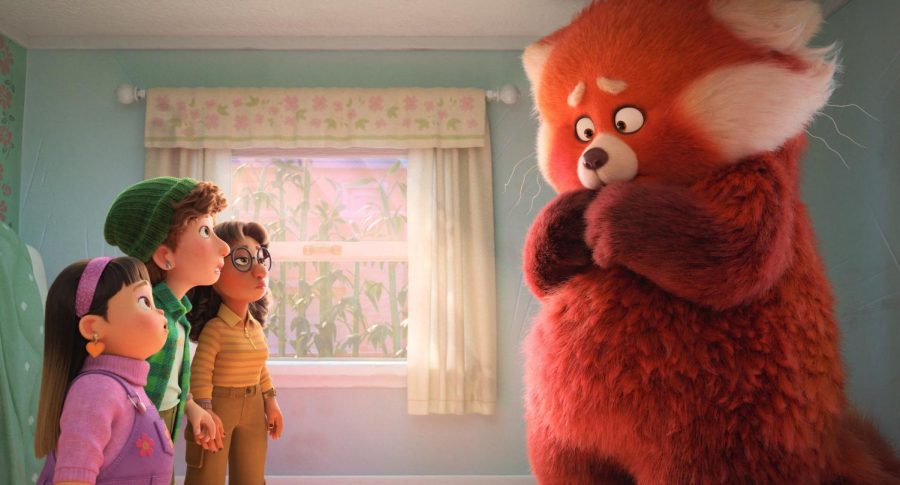‘Turning Red’ is the movie of female adolescence we need
March 31, 2022
“Turning Red” directed by Chinese Canadian Domee Shi gave us the coming-of-age movie that the world needed most.
It is the story of Mei Lee, a Chinese Canadian girl who experiences the chaos of adolescence along with her overbearing mother and her three best friends, with whom she shares an avid devotion to the popular boy band of the moment.
With all the problems that come with being a 13-year-old girl — the embarrassment of having your crush know that you like them, an overprotective and bossy mom, hormones and the frustration of not being able to go to your favorite band’s concert — Mei also has to suffer from an ancient curse that runs in her family: every time her emotions aren’t under control, she transforms into a big red panda.
The importance this movie has is pretty clear —this is one of the first times that a movie focuses on the female gaze and perfectly portrays girls’ early teen years.
This is a refreshing change from the world of cinema that has historically been oriented toward making content catered for white men.
Never in my life have I seen pads and other menstrual sanitary products on television so clearly, nor have I seen such a good portrayal of girls fangirling over a boy band in a non-derogatory way. This movie serves as an example that the emotions expressed by the characters are totally normal.
The production team focused on the emotions of the protagonist. The audience, whether it be young children or adults, can relate to most of the things happening to Mei.
“Girls and women are always judged for not controlling their emotions — ugh, she’s so emotional,” Lindsey Collins, the producer of the film, said about the portrayal of emotions in the movie. “I love that we have a main character who is learning over time that she doesn’t have to push emotions away or get rid of them to be considered a good girl or a good woman. ,The movie is ultimately about being able to own your emotions. Own ’em!”
But it is because of this female gaze brought by a woman-led team that resulted in the movie’s polarizing reviews.
After the film’s release on Disney+ on March 11, a very controversial review was uploaded online.
The now unpublished review by CinemaBlend’s managing director Sean O’Connell “complained that the film’s focus on Lee’s Asian background” and storylines focusing on her adolescence and “limited the film’s ability to connect with audiences.”
Once O’Connell’s review was published, a swarm of responses quickly countered his argument. Jeff Yang of The Guardian in particular noted that Hollywood movies have always catered toward the white male gaze.
“When you’re white, most of what you see in American popular culture is designed with you as the default. That’s even more the case when you’re a white male of a certain age,” Yang said. “Male characters are crafted to be aspirational to you, and female ones to be attractive to you, in works largely imagined, created and marketed by people who also happen to belong to the Prime Demographic.”
The movie undoubtedly delivers all these topics in a really fun and enjoyable way. All the messages that help draw attention to women of various minority groups are conveyed in a really natural way.
Users online were quick to praise the movie in that aspect.
“Acknowledging young girls (and boys) having these…FEELINGS…doesn’t have to mean sexualizing them, or making them grow up super fast, or even have anything to do with the actual ACT of having sex,” a user expressed on Twitter.“Turning Red” is a prime example of how to do that, safely and well,”
In addition to that, the film is full of pop culture references that will make the watchers smile from a book that clearly resembles the iconic vampire novel series “Twilight” to boy bands inspired by real life groups like BTS and the Backstreet Boys.
“Turning Red” composes a beautiful and humorous funny tale about finding one’s true self. It sends an important message to younger generations, especially to young girls going through the similar period of maturity.
The message of the movie is clear: emotions are not irrational or unjustified, and no matter what other people may say, any person has the ability to lead them in whatever path makes them the happiest.







